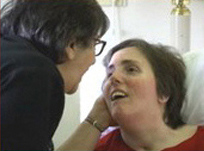
NASHVILLE (BP) — The 10th anniversary of Terri Schiavo’s death has prompted discussions of marriage laws, the definition of a “good death” and even the pro-life record of former Florida Gov. Jeb Bush, an apparent frontrunner for the 2016 GOP presidential nomination.
 “Sadly, even now, after a decade of hindsight, we fail to see what led us to this tragedy,” Joe Carter, a communications specialist for Southern Baptists’ Ethics & Religious Liberty Commission, wrote on the ERLC website. “Many well-meaning people mistakenly believe the primary issue was about autonomy or the ‘right to die.’ But at its core, the Schiavo case was not about bioethics, living wills, or medical choice; it was about the failure to protect the institution of marriage.”
“Sadly, even now, after a decade of hindsight, we fail to see what led us to this tragedy,” Joe Carter, a communications specialist for Southern Baptists’ Ethics & Religious Liberty Commission, wrote on the ERLC website. “Many well-meaning people mistakenly believe the primary issue was about autonomy or the ‘right to die.’ But at its core, the Schiavo case was not about bioethics, living wills, or medical choice; it was about the failure to protect the institution of marriage.”
Schiavo died March 31, 2005, at age 41 some 15 years after collapsing in her St. Petersburg, Fla., home in cardiac arrest. After two and a half months in a coma, Schiavo appeared to improve and physicians diagnosed her as being in a “persistent vegetative state” — though other physicians disputed that diagnosis during legal proceedings.
Schiavo’s husband and legal guardian Michael Schiavo — who fathered two children with his live-in girlfriend after Terri’s collapse while remaining married to Terri — sought the removal of her feeding tube for nearly a decade. He contended Terri would not have wanted to live in her physical condition although she had left no written directive concerning end-of-life care.
Michael Schiavo inherited more than $700,000 from Terri’s estate, money gained from a medical malpractice suit. The bulk of Michael Schiavo’s inheritance was used to pay his attorney fees, according to the pro-life organization Priests for Life.
Despite attempts to save Schiavo by her parents, the Florida state legislature, Jeb Bush, the U.S. Congress and President George W. Bush, her feeding tube was removed March 18, 2005. She died of starvation 13 days later. The case stirred a public debate between so-called “right to die” advocates and pro-life groups.
 Carter said Schiavo’s death was due in part to the repeal of common law marriage and the adoption of no-fault divorce laws in Florida. Laws recognizing common law marriage might have helped acknowledge Michael Schiavo’s longstanding relationship with another woman as an illicit marriage. No-fault divorce laws prohibited courts from factoring Michael’s adultery into considerations of his moral fitness as Terri’s husband, Carter wrote.
Carter said Schiavo’s death was due in part to the repeal of common law marriage and the adoption of no-fault divorce laws in Florida. Laws recognizing common law marriage might have helped acknowledge Michael Schiavo’s longstanding relationship with another woman as an illicit marriage. No-fault divorce laws prohibited courts from factoring Michael’s adultery into considerations of his moral fitness as Terri’s husband, Carter wrote.
Christians should advocate for reconstitution of common law marriage and repeal of no-fault divorce, Carter wrote. Common law marriage can still be contracted in at least eight states, according to the National Conference of State Legislatures. No-fault divorce is available in all 50 states.
“Even though Michael Schiavo had committed adultery, sired illegitimate children, and openly shared Terri’s marriage bed with another woman, he was still considered fit by the courts to undertake his role as a husband,” Carter wrote. “Under that role he was not only allowed to choose actions to be taken that would cause her death, but was allowed to benefit by inheriting her estate. In giving him guardianship over Terri while he lived as the cohabitating, common law ‘husband’ of another women, the Florida courts exposed the absurdity of modern marriage laws.”
Joni Hannigan, then-managing editor of the Florida Baptist Witness, covered Schiavo’s struggle for life extensively. Hannigan wrote in a 2006 Baptist Press column that the moral issues surrounding Schiavo’s death were clear.
“By the time I had read volumes of court transcripts, sat in court and listened to Michael Schiavo’s attorney, heard Schiavo speak at press conferences, and read excerpts of the attorney’s book representing his worldview, the coverage strategy I employed seemed elementary to me,” Hannigan wrote.
“My convictions led me to a conscientious approach to reporting that made me wary of seeking to promote views which openly condoned adultery and euthanasia. Simply put, I would not actively seek to give ink to Michael Schiavo’s distorted views of love and fidelity — and would not knowingly engage in unfruitful interviews with Schiavo’s attorney, whose pro-euthanasia views had been clearly established,” Hannigan wrote.
Jeb Bush
Reporting on Jeb Bush’s presumed quest for the White House, the Wall Street Journal wrote March 29, he “rarely, if ever, trumpets one of his most enduring conservative credentials: his yearslong effort to save Terri Schiavo.”
Bush, who was Florida’s governor when Schiavo died, fast-tracked a state law in 2003 requiring her feeding tube to be reinserted after a judge ordered its removal. When the Florida Supreme Court ruled “Terri’s Law” unconstitutional, Bush urged his brother, President George W. Bush, to take action on the federal level.
Asked in February whether he had any regrets related to his handling of the Schiavo case, Jeb Bush said according to the Journal, “No, I acted on my core belief that the most vulnerable in our society should be in the front of the line. They should receive our love and protection.”
In 2005, a Wall Street Journal/NBC News poll found that 51 percent of Americans believed removing Schiavo’s feeding tube was “the right thing to do.”
A Bush spokeswoman told the Journal the former governor “believes it’s appropriate to err on the side of life and promote human dignity, especially in a situation that was as complicated as the Terri Schiavo case.”
A good death
Joy Riley, a physician who serves as executive director of the Tennessee Center for Bioethics & Culture, told BP it is difficult to formulate public policy or ethical principles based on a “hard case” like Schiavo’s. However, she said the 10th anniversary of Schiavo’s death is an appropriate occasion for Christians to reflect on the Bible’s teaching about death.
“Scripture teaches that the end of life, like the beginning of life and indeed like all of life, is in the hands of God,” Riley said. The Ten Commandments prohibit murder without a “distinction between murder of self and murder of others,” she said, noting that scriptural principles stand opposed to ending an ill or injured person’s life prematurely.
While Schiavo’s 15-year state of limited consciousness was unique, as was her experience of having a guardian who stood to benefit from her death, many people face lingering illnesses that stretch into months or even years. Riley offered medical and ethical advice to individuals facing end-of-life scenarios more typical than Schiavo’s.
The frequently expressed wish to die suddenly rather than from a protracted illness is not necessarily consistent with what followers of Christ have regarded as a “good death,” Riley said.
“Historically, people of faith have seen the blessing of having some time to prepare so that you ‘finish well’ by making amends with others …, preparing yourself to die, getting your affairs in order and spending time readying yourself to meet your maker and giver of life,” Riley said.
Causing death to occur with unnecessary swiftness may rob a person of the opportunity to experience the “kindness of God and others” at the end of life, Riley said.
Though doctors once spoke of whether to use “extraordinary measures” to extend life, that term is used less commonly today, Riley said. Instead, medical professionals evaluate the “burdens and benefits” of potential end-of-life therapies.
“Look at the proposed therapy and say, ‘What will this entail?'” Riley said. “Will this entail that the person be hospitalized, or will you have to drive 80 miles a day to the place where you can get it? Does it in any way oppress anybody?” Treatments that destroy embryos or impose excessive financial burdens qualify as oppressive, she said.
Questions to ask about the benefit of end-of-life therapies, Riley said, include, “Is it going to prolong the end of my life by months, perhaps years? Or is it more like days or weeks or even hours? What will the experience of my family be in helping me procure this therapy?”
Even individuals without medical training can ask intelligent questions and make biblical decisions, Riley said. She urged Christians to remember that life is brief and pray like Moses, “Teach us to number our days that we may get a heart of wisdom” (Psalm 90:12).
















